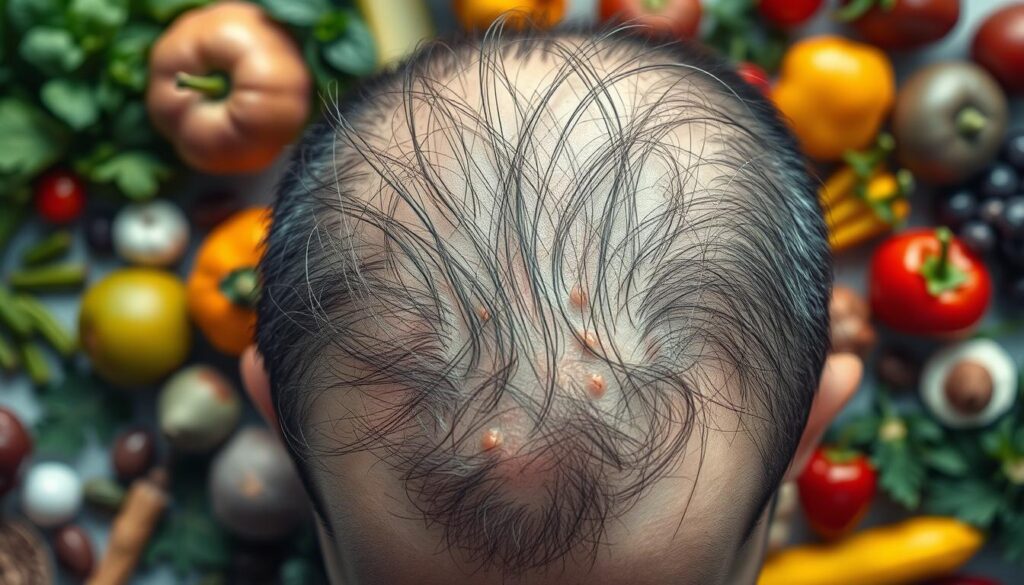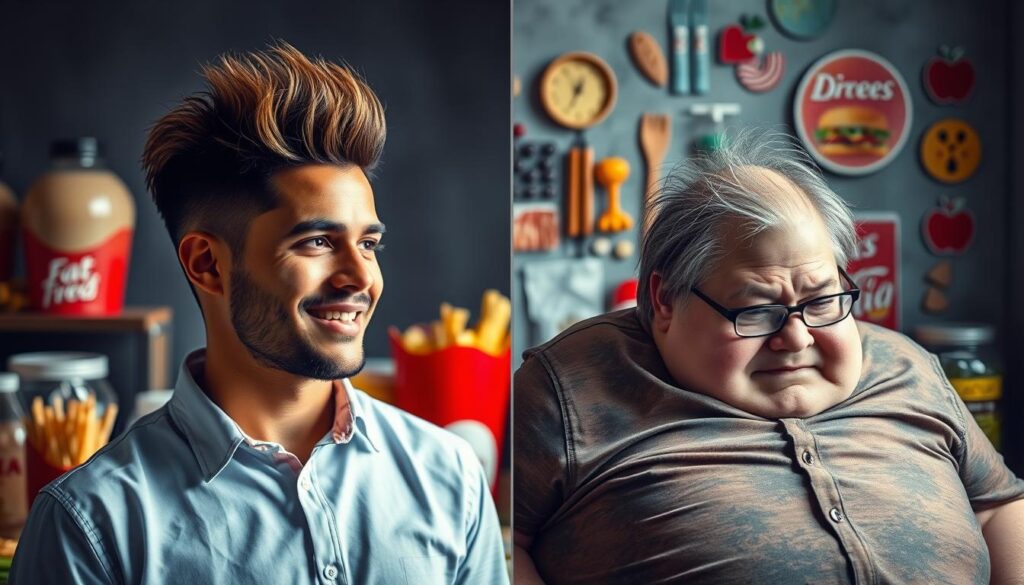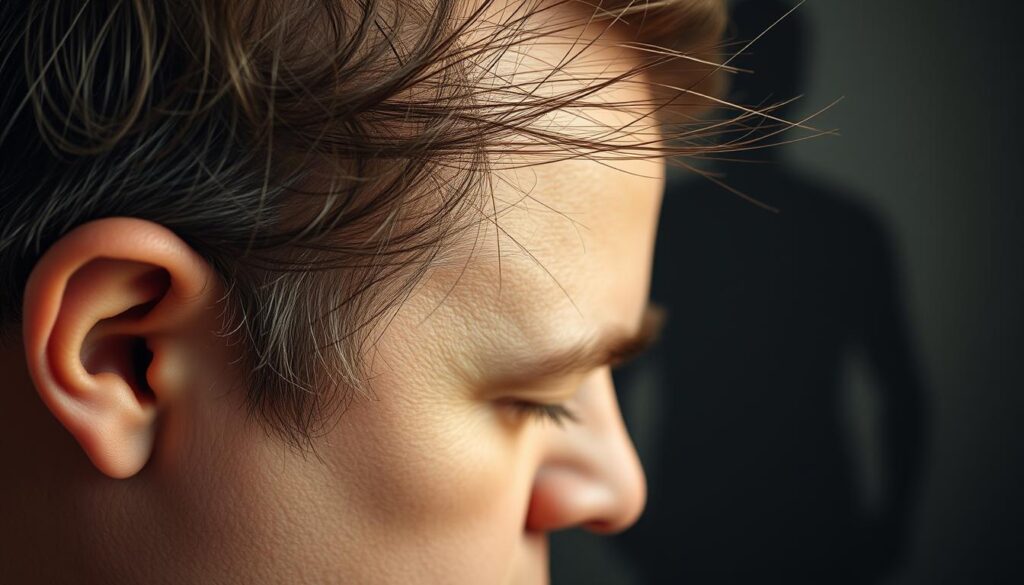Obesity might not directly cause hair loss. But, the lifestyle of someone who is overweight can harm their hair. Issues like metabolic syndrome and hormonal imbalances are common in obese people. These can lead to thinning hair and faster hair loss.
But, there’s good news. Simple lifestyle changes can fight obesity-related hair problems. This article will dive into the link between obesity and hair loss. We’ll share the latest science and tips to keep your hair healthy and strong.
Key Takeaways
- Obesity is not a direct cause of hair loss, but it can indirectly contribute to hair thinning and shedding.
- Chronic stress, hormone imbalances, and nutritional deficiencies associated with obesity can all impact hair growth cycles.
- Gradual weight loss is recommended to prevent hair loss, while sudden weight loss or crash dieting can lead to temporary hair shedding.
- Exercise and small lifestyle changes can help improve blood flow to the scalp and support healthy hair follicles.
- Addressing the underlying causes of obesity-related hair loss, such as stress and nutrient deficiencies, can significantly improve hair growth.
Understanding the Link Between Obesity and Hair Health
Obesity affects your health and hair. Knowing how obesity and hair health are linked is key to solving hair problems.
Defining Obesity and BMI Standards
Obesity is measured by the Body Mass Index (BMI). It’s based on your height and weight. A BMI of 30 or higher means you’re obese.
In the U.S., 41.9% of adults over 20 are obese. Severe obesity affects 9.2%.
The Global Obesity Crisis
Obesity is a big problem worldwide. Over 1 billion people are obese. This includes 650 million adults, 340 million teens, and 39 million kids.
Impact on Overall Health
Obesity harms your health a lot. It raises the risk of many diseases. These include type 2 diabetes, heart disease, and cancer.
Being obese can shorten your life by 3 to 10 years. It’s linked to 1 in 13 deaths in Europe.
“Changes in the hair and skin of mice occurred after just four days on a high-fat diet, with significant increases in oxidative stress known to affect hair loss.”
The obesity crisis is getting worse. It’s important to know how it affects your hair. By tackling obesity, you can keep your hair and health in check.
Can Obesity Cause Hair Loss: The Scientific Evidence
Research shows a strong link between obesity and hair loss. A study in Nature found that obesity harms hair follicle stem cells. This leads to thinner and lost hair.
Just four days of eating a lot of fat can start this problem. It makes these stem cells work wrong, causing hair issues.
Long-term eating too much fat makes things worse. It fills stem cells with fat and stops them from working right. This causes hair to thin and fall out.
This study helps us understand how obesity affects hair. It shows how to fight obesity hair thinning and weight gain alopecia.
| Key Findings | Impact |
|---|---|
| Obesity-induced stress targets hair follicle stem cells (HFSCs) | Accelerates hair thinning and loss |
| High-fat diet feeding depletes lipid-laden HFSCs | Leads to hair follicle miniaturization and hair loss |
| Obesity disrupts Sonic hedgehog (Shh) signaling in HFSCs | Impairs hair follicle regeneration and growth |
This research shows how obesity speeds up hair loss. It helps those with obesity hair thinning and weight gain alopecia to fight it. They can work on improving their hair health.
How Excess Weight Affects Hair Growth Cycles
Too much weight can hurt your hair growth. It leads to hair loss. This happens because of hormonal and metabolic changes in obesity.
The Role of Hormonal Imbalances
Being overweight can mess with your hormones. This includes testosterone and cortisol. These changes can make your hair fall out early.
Metabolic Changes and Hair Follicles
Obesity can change how your hair follicles work. Instead of growing hair, they might make more oil glands. This can cause hair loss.
Inflammation and Hair Loss Connection
Being overweight can cause long-term inflammation. This can harm your hair follicles. It makes your hair thin and fall out more.
“Obesity-induced metabolic stress changes the fate of hair follicle stem cells, directing them towards sebaceous glands and epidermal keratinocytes, ultimately contributing to hair loss.”
Nutritional Deficiencies in Obesity-Related Hair Loss
Being overweight can lead to hair loss. This is because extra weight can cause a lack of important nutrients. These nutrients are key for hair to grow well.
Research finds that up to 50% of the scalp can suffer from hair thinning. This usually gets better in six months. But, fixing the nutrient deficiencies is crucial to stop it from coming back.
Some common nutrient shortages in obesity-related hair loss are:
- Iron deficiency: This is a big problem worldwide. It affects both men and women, especially women before menopause.
- Zinc deficiency: Zinc helps hair follicles stay healthy. Low zinc levels are linked to hair loss.
- Protein malnutrition: Hair needs amino acids to grow. Lack of certain proteins can cause hair loss.
Eating well or taking supplements can help hair grow back. It can also stop more hair fall in people with obesity-related hair shedding.

Seeing a doctor is key if you keep losing hair. They can check for health issues and help you eat better for healthier hair.
The Impact of Oxidative Stress on Hair Health
Oxidative stress happens when our body can’t fight off harmful molecules. It can hurt our hair. Things like bad diets, too much alcohol, and smoking can cause it. This leads to early baldness and inflammatory alopecia.
Free Radicals and Hair Follicle Damage
Free radicals are bad molecules from our body’s work. They damage hair follicles. This messes up hair growth, making more hairs fall out.
Obesity-Induced Oxidative Stress
Obesity also causes oxidative stress. A study in Nature showed that fatty diets harm hair follicles. This leads to hair loss.
Eating foods full of antioxidants helps. Vitamins C and E, and things like fruits and nuts, are good. Also, hair products with antioxidants can help our scalp and hair.
“Oxidative stress can cause oxidative damage to hair follicles, disrupting the hair cycle and leading to pathological hair loss.”
Knowing about oxidative stress helps us keep our hair and scalp healthy. We can do this with a good diet and special hair care.
Lifestyle Factors Contributing to Hair Loss in Obese Individuals
Being overweight can hurt your hair health. Some lifestyle choices can make it worse. Let’s look at how your daily habits might cause weight gain alopecia and insulin resistance hair shedding.
Not moving much and not exercising can hurt your scalp’s blood flow. This can harm your hair follicles. A study showed 21% of men and 25% of women in the U.S. don’t move much in 2016. This can mess up your hair growth cycle.
Stress, often seen in obesity, can also cause hair loss. High cortisol levels and hormonal imbalances can mess up hair growth. This can lead to too much shedding and thinning.
- Poor eating habits and not getting the right nutrients can make your hair thinner and fall out.
- Lacking iron, zinc, protein, and omega-3 fatty acids can hurt your hair follicles and slow growth.
It’s key to tackle these lifestyle issues to feel better and have healthy hair. Regular exercise, managing stress, and eating well can help stop and fix hair loss from being overweight.

“Taking a holistic approach to your health, including your hair, is key to achieving the desired results.”
By fixing the reasons for your hair loss, you can feel more confident and full of life. Remember, your hair shows how well you’re doing overall. Changing your lifestyle can really help.
Hair Loss Patterns Associated with Weight Issues
Obesity and hair loss are linked in complex ways. Obesity doesn’t directly cause hair loss. But, it can lead to hormonal imbalances and metabolic changes that harm hair health.
Telogen Effluvium in Obese Patients
Telogen effluvium is common in obese people. It causes hair to thin all over. This happens because of nutritional shortages and metabolic stress from being overweight.
The body reacts to these stressors by making more hair follicles rest. This leads to more hair falling out.
Pattern Hair Loss Acceleration
Obesity can make pattern hair loss worse. A study in Nature showed that a high-fat diet harms hair follicles. It makes hair thinner and shorter.
| Condition | Prevalence in Obese Individuals | Potential Causes |
|---|---|---|
| Telogen Effluvium | Common | Nutritional deficiencies, metabolic stress |
| Pattern Hair Loss Acceleration | Increased risk | High-fat diet, hair follicle miniaturization |
Obesity can lead to hair loss, but it’s not the only reason. Genetics, hormonal imbalances, and other health issues also matter. Getting help from doctors and nutritionists is key to understanding the link between weight and hair health.
Prevention and Treatment Strategies
Eating well and losing weight slowly are important. This helps prevent hair loss. Crash diets can make your body lack important nutrients, causing hair to fall out. So, choose a healthy way to lose weight that helps your hair grow.
If you worry about bariatric surgery hair regrowth, talk to your doctor. Some treatments might help your hair grow back. They work by fixing problems caused by a bad diet. Also, special hair treatments can help if you’re losing hair because of being overweight.
It’s also key to stop hair loss from nutrient deficiency hair fall. Make sure you eat enough protein, iron, zinc, biotin, and vitamins A, C, D, and E. These are all good for your hair. If you need more, take a good multivitamin. And, see a hair loss expert to get a plan to keep your hair healthy while you lose weight.


A Life-Changing Experience with This Weight Loss Supplement (Nagano Tonic)
I’ve always struggled with finding a weight loss solution that actually works for me. Like many, I’ve tried numerous diets, exercise routines, and supplements over the years—some worked for a short time, but nothing ever gave me long-term results. That was until I decided to try the weight loss supplement I found : Link to the Supplement.
From the moment I started using it, I noticed a difference. Not only did I feel more energized, but my cravings also became more manageable. The best part? I started seeing results much quicker than I anticipated! Over the course of just a few weeks, I noticed a significant reduction in belly fat and overall weight loss that I hadn’t been able to achieve before.
What makes this supplement stand out from all the others I’ve tried is how it supports me in my daily routine without any jitters or energy crashes. I’m able to stay focused and motivated, which has made it easier to stay on track with my diet and exercise plan.
This product truly exceeded my expectations, and I feel more confident and healthier than ever before. If you’re struggling with your weight loss journey like I was, I highly recommend giving this supplement a try. It’s been a game-changer for me, and I’m sure it can work wonders for you too!
Contant Them on email .. tonicnagano50@gmail.com
I’ve tried so many weight loss products over the years, but nothing worked like this supplement! Since I started using it, I’ve noticed a big difference in my energy levels and appetite control. In just a few weeks, I’ve lost weight and feel so much better. It’s been easy to stick with, and the results speak for themselves. Highly recommend this to anyone looking to make a real change!
wasn’t sure what to expect, but this weight loss supplement has really impressed me! After just a few weeks of use, I’ve already dropped a few pounds and feel more motivated to stay active. It’s helped curb my cravings and boosted my energy throughout the day. I’m excited to keep going and see even better results. Definitely worth trying!
Reach them on tonicnagano50@gmail.com
I’ve tried so many weight loss products, but this one has been by far the most effective. In just a few weeks, I’ve noticed a visible difference in my body and energy levels. It’s helped me stay on track without the constant hunger pangs and cravings. I’m really happy with my progress and can’t wait to see where I’ll be in another month!
This Nagano Tonic has been amazing! In just a few weeks, I’ve lost weight, feel more energized, and my cravings are under control. Highly recommend it!
Thats the link to purchase http://surl.li/iasppy